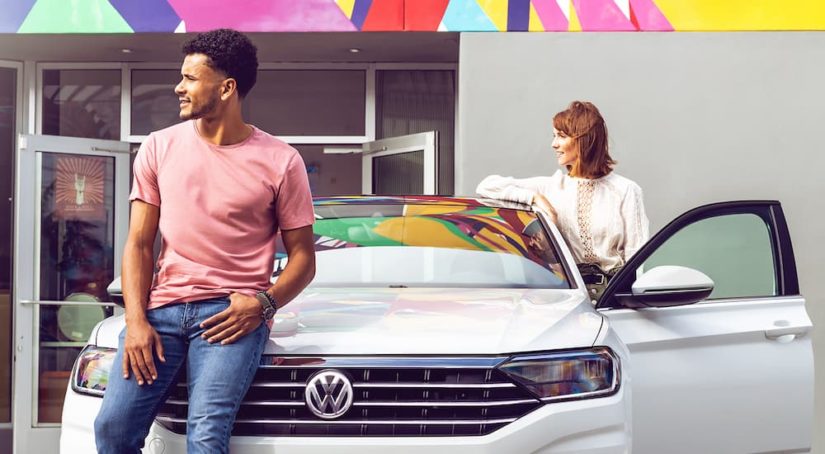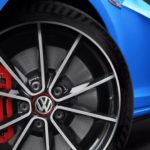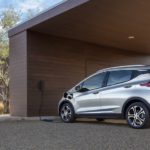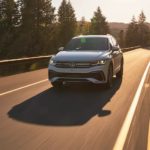It’s hard to remember a time when sedans outsold SUVs, but it actually wasn’t that long ago. Today, most automakers have stripped down their sedan offerings to a select few—or none at all. What remains is the cream-of-the-crop, which is good news for sedan buyers. Cars like the 2022 Volkswagen Jetta vs the 2022 Toyota Corolla are better than ever.
Why are automakers investing in a shrinking segment? With fewer buyers, competition is stiff; grabbing market share requires producing high-quality sedans that tick every box. Performance, infotainment, and creature comforts are high on buyers’ lists. Even entry-level buyers crave modern conveniences. The lucky ones also find models with style and refinement.
Volkswagen’s best-selling sedan, the compact Jetta, remains a perennial favorite among first-time buyers and commuters, but it’s also a great choice for young families who don’t want a boxy crossover. Budget-wise, even the top-end SEL trim manages to stay well under $30,000—while offering a unique assortment of safety, tech, and comfort features. A closer look at VW’s premium Jetta SEL reveals a surprising array of next-generation technology, from infotainment to semi-autonomous safety and convenience systems.
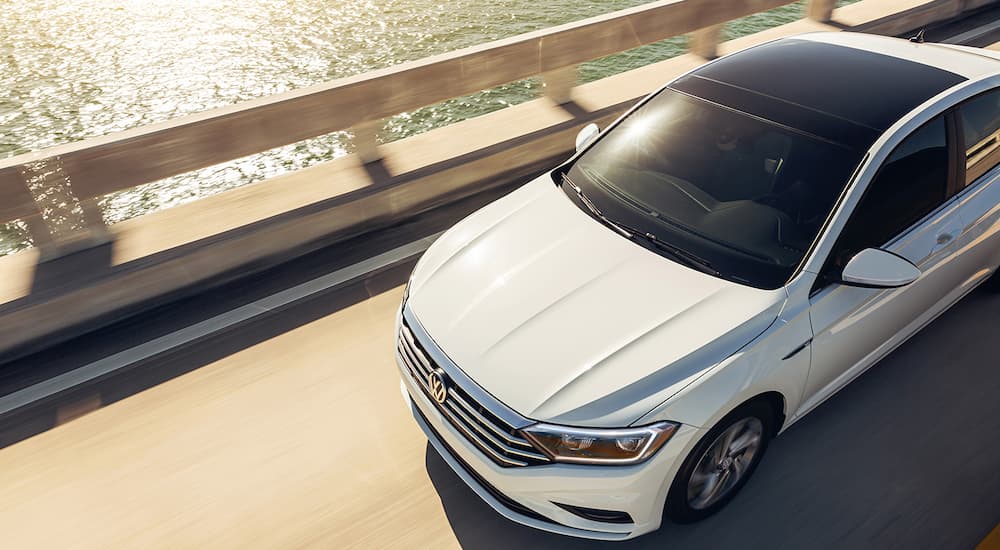
Exterior Tweaks and Powertrain Innovations
For 2022, Volkswagen stylized the Jetta’s classic minimalist exterior architecture with sharper angles and a re-crafted front end, creating the ideal canvas for the SEL’s impressive list of upgrades. A set of new, 17-in., 5-spoke alloy wheels come standard on the high-end SEL trim, along with high-performance LED projector headlights and taillights, daytime running lights, and an extra unexpected touch: LED license plate lighting.
Say goodbye to frozen windshield washer fluid: VW adds a heat feature to the windshield washer nozzles, and throws in standard rain-sensing windshield wipers for added measure. Simply set them to auto and they’ll come on automatically at a speed that matches the current rainfall rate. The side mirrors are also heated and have a sanity-saving memory feature for households with more than one driver. Rounding out the list of standard exterior features is a power panoramic sunroof and automatic high beams.
In fairness, all Jetta trims reap the rewards of Volkswagen’s new 1.5-L turbocharged four-cylinder power plant, but it’s worth mentioning anyway. Employing Miller Cycle engine technology, a patented technology that improves efficiency by as much as 15%, Miller Cycle engines employ superchargers to delay the compression stroke, which lowers the engine’s temperature and facilitates a higher compression ratio. That’s the technical way to describe it. In layman’s terms, Miller Cycle engines are more efficient, both in fuel consumption and the manner in which they deliver output.
The Volkswagen’s 1.5-L motor, which is mated to an 8-speed transmission, makes 158-horsepower and 184 lb-ft of torque. And, it offers impressive, class-leading fuel economy ratings of 31 mpg city and 41 mpg highway. Drivers will especially appreciate the Jetta’s generous low-end torque for brisk acceleration to highway speeds. Considering the Jetta’s curb weight is a diminutive 3,060 lbs, the turbocharged four-cylinder is more than enough propulsion.
Infotainment Tech on the Inside
Front-and-center on the 2022 Jetta SEL’s dash is a robust 8-in. Discover Media infotainment touchscreen with navigation. Formally called a modular infotainment matrix (MIB3) by VW, it’s glass-covered—a nice touch for drivers who don’t like the feel of the more common resistive screens—and serves as a control hub for driving data, smartphone connectivity, and more.
Making the most of VW’s connected capabilities requires a Car-Net subscription. Launched in 2014, Car-Net is Volkswagen’s connected services system. It has a host of convenience features, like remote start and remote door lock/unlock, but the intuitive MIB3 software levels up its intelligence, so drivers can even use it to find empty parking spots. Volkswagen’s partnership with Parkopedia makes finding parking garages at any destination nationwide one-touch-easy.
The SEL’s infotainment package includes subscription-based connected navigation for real-time traffic updates, along with an available Car-Net Hotspot. All-new Jetta SEL models come with a 3-month trial subscription to SiriusXM’s 360L service, which includes a vast library of on-demand content and the usual lineup of commercial-free programming. Users can create profiles that include favorite sports teams, and can receive notifications when games are on.
Also standard on the Jetta SEL is a unique BeatsAudio premium sound system. The 12-channel, 400-watt system features nine speakers and a subwoofer for rich, nuanced sound. Since Apple CarPlay and Android Auto connectivity come standard, drivers can easily access smartphone content like Spotify playlists or the latest episode of their favorite podcast. Nothing makes a commute go faster than listening to something interesting and entertaining. It’s a bonus when the sound system delivers concert-grade sound.
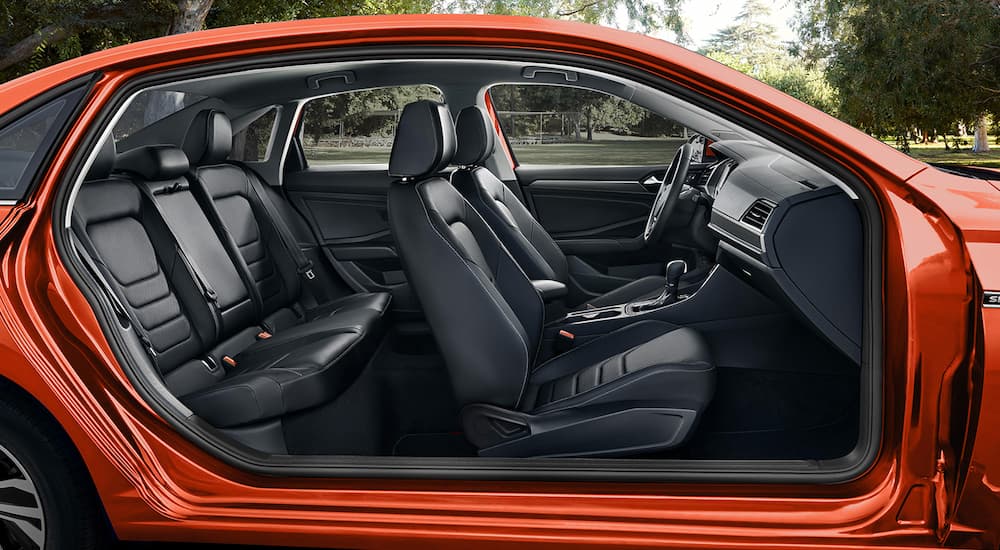
Safety and Driver-Assist Innovations
Along with the Jetta’s six airbags and standard Electronic Stability Control, the SEL’s standard IQ.DRIVE suite of driver-assist systems construct a virtual bubble around the vehicle to keep occupants safe. The sensor-, camera-, and radar-dependent suite of systems constantly monitors the area surrounding the vehicle, alerting the driver with audible and visual warnings—and even stepping in with automatic braking and emergency steering to avert or minimize the severity of a collision.
Volkswagen’s IQ.DRIVE includes a front camera, front and rear radar, and a series of ultrasound sensors to detect and inform drivers. Front Assist combines Forward Collision Warning and Autonomous Emergency Braking to help drivers avert a crash in front of the vehicle, sending visual and audible alerts and intervening with extra automatic braking when necessary. It’s especially helpful in unpredictable stop-and-go traffic.
Blind Spot Monitor and Lane Assist help with safe lane changes, keeping an eye out for oncoming traffic on both sides of the vehicle. When the turn signal is activated and a vehicle is detected, the system warns the driver and countersteers, if necessary, to return the Jetta to its original lane of travel. The Lane Keeping System works similarly, alerting the driver if it senses the vehicle drifting out of its lane.
Perhaps most notable is Emergency Assist, a system that can bring the car to a complete stop in extreme situations. It works by constantly monitoring the driver’s level of attentiveness through steering input (e.g., hand grip on the steering wheel), first sending a series of alerts and brake jolts. Then, if no change is detected, the system will gradually slow the vehicle down, come to a complete stop, and turn on the hazard lights.
A Classic Sedan with New Age Tech
Volkswagen’s robust Jetta refresh doesn’t just benefit Volkswagen; it evidences the automaker’s commitment to the sedan body style. For SUV-averse buyers, any sign that manufacturers aren’t abandoning the category altogether is heartening. SUV fatigue is coming. Even the newest EUV models are favoring car-like dimensions.
VW’s ID.4 is technically an EV SUV, but certain angles make it look more like an old-school station wagon (in a good way). Companies like Subaru show the same restraint with some of the most popular models, avoiding size creep and leaning more toward car-like dimensions. It’s encouraging for drivers who prefer to feel the road from a lower standpoint.
Will SUVs ever go away altogether? It’s doubtful, but neither will sedans—despite the handful of manufacturers that have eliminated them from their lineups. Chances are, consumer tastes will change; when they do, automakers like Volkswagen will be ready. As for the brands that decided Americans were done with sedans? These companies may end up on the losing end of “trendy.”
